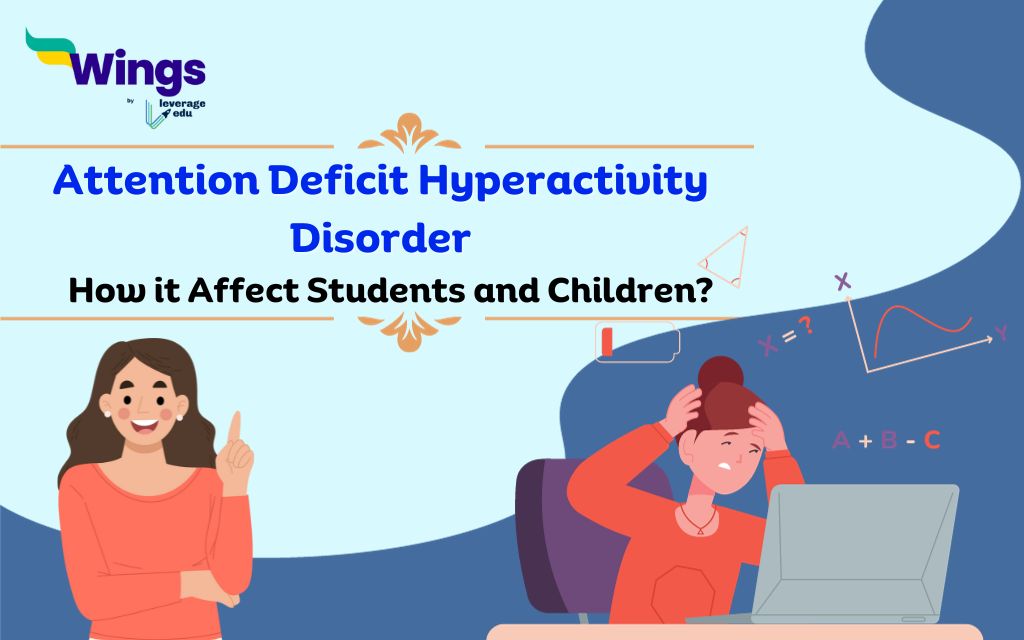ADHD in Children: Studies have shown that early signs of ADHD can lead to dementia in both children and adults. ADHD or Attention Deficit Hyperactivity Disorder neurodevelopmental disorder in children. Children suffering from ADHD find difficulty in paying attention, have impulsive behaviour and are mostly hyperactive. This chronic condition requires early treatment from a specialist, which will not only cure it but will provide you with some additional details on its symptoms, treatments and other related details. Let’s talk in detail about ADHD in children.
Also Read: MSc Infectious Diseases
Also Read: World Alheimer’s Day 2023
ADHD in Children: Symptoms
ADHD symptoms in children depend on their type. There are three (3) different types of ADHD:
- Inattention: Children find it difficult to stay focused, follow instructions and complete their tasks.
- Impulsivity: They act without thinking, interrupt others and lose patience.
- Hyperactivity: feels restless, always fidgeting and constantly moving around. It may manifest as excessive talking or an inability to sit still.
Here are the symptoms of ADHD in children.
- Difficulty staying focused on tasks or play activities.
- Frequently making careless mistakes in schoolwork or other activities.
- Difficulty organizing tasks and activities.
- Forgetting daily activities.
- Excessive fidgeting or squirming.
- Difficulty remaining seated during situations where it is expected.
- Running or climbing in inappropriate situations.
- Difficulty playing quietly.
- Talking excessively.
- Frequently interrupting or intruding on others’ conversations or activities.
- Difficulty waiting for their turn in games or group situations.
- Bluntly answering questions before they have been completed.
Also Read: World Heart Day 2023
What Causes ADHD?
According to the reports released by the Centers for Disease Control and Prevention (CDC), children in the age group 3 to 17 mostly suffer from ADHD. There can be several reasons causing ADHD in children, some can have it genetically, brain function and structure, etc. Below we have discussed some of the common causes of ADHD.
- Studies have shown that children with a family history of ADHD are more likely to develop the condition themselves.
- Differences in brain structure and functioning have been observed in individuals with ADHD, particularly in areas of the brain that regulate attention, activity, and impulse control.
- Neurotransmitters, such as dopamine and norepinephrine, play a crucial role in regulating attention, behaviour, and impulse control. Imbalances in these neurotransmitters may contribute to the development of ADHD symptoms.
- Environmental factors, such as exposure to environmental toxins (e.g., lead) during early development, low birth weight, or prenatal tobacco and alcohol exposure, may increase the risk of developing ADHD.
Moreover, factors like high levels of stress, inconsistent parenting, or a chaotic home environment may exacerbate symptoms in individuals who are already genetically predisposed to the disorder.
ADHD in Children: Treatment
The chronic condition of ADHD can be treated effectively by a combination of strategies and treatments tailored according to the children’s specific needs. Before treating a patient with ADHD, you need to ensure that the goal of treatment is to reduce the impact of symptoms on daily functioning and improve the individual’s quality of life.
- Medications such as methylphenidate, amphetamines and non-stimulants, can help manage symptoms of ADHD. These medications work by affecting the brain chemicals that play a role in impulse control and attention.
- Cognitive Behavioural Therapy (CBT), can be of great help to individuals in developing coping strategies and skills to manage symptoms and improve behaviour.
- A household treatment for ADHD is education. Educating parents and elders about ADHD and teaching them behavioural management techniques can significantly help in managing symptoms in children.
- There are certain lifestyle modifications such as regular exercise, a healthy diet, adequate sleep, and minimal exposure to environmental stressors can be a great way to manage ADHD symptoms.
Note: This is not a piece of medical advice, you must seek counselling if required.
Related Articles
FAQs
ADHD stands for Attention Deficit Hyperactivity Disorder.
ADHD symptoms in children can vary depending on the specific type of ADHD: difficulty in maintaining focus, forgetting daily activities, difficulty following instructions or finishing tasks before moving on to another activity, impatience in waiting their turn, etc.
Here are some of the popular treatments for ADHD: Use medications, such as stimulants (methylphenidate, amphetamines); lifestyle modifications such as regular exercise, a healthy diet, and adequate sleep; Cognitive Behavioural Therapy (CBT), etc.
For more information on such interesting topics, visit our trending events page and follow Leverage Edu.


 One app for all your study abroad needs
One app for all your study abroad needs












 60,000+ students trusted us with their dreams. Take the first step today!
60,000+ students trusted us with their dreams. Take the first step today!